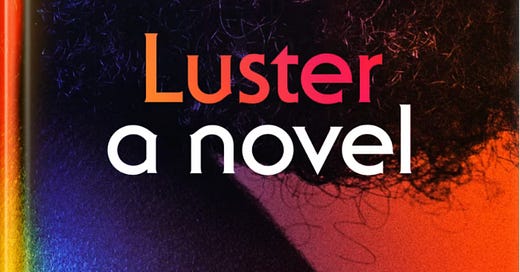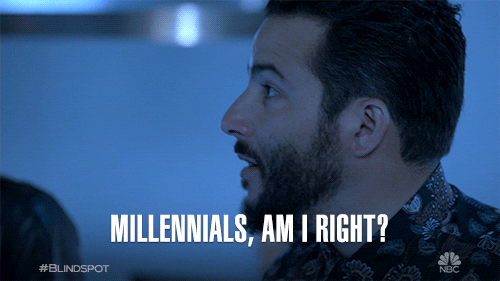'Luster' by Raven Leilani
'I think of all the gods I have made out of feeble men.'—Review #150
Hope you all had a restful and happy holiday season, and that 2021 is off to a good start for you. I’m beginning this year with one of the hottest debut novels of last year. ‘Luster’ was everywhere in 2020, from book review sections to tweets to Instagram posts. Among other things, it was one of The New York Times’s 100 most notable books, and President Barack Obama listed it among his favorite reads, too. Here’s the cover:
If you enjoy this review, click the ♥️ above. New here?
The story follows Edie, a twenty-something black woman in a relationship with an older white man named Eric who’s in an open marriage. Edie’s life is a mess. She gets fired from her job in book publishing for having one too many office liaisons, and she is evicted from her Bushwick apartment when she can’t afford the rent. In her subsequent job as a delivery worker, Edie encounters Eric’s wife, Rebecca, who invites her to live with them in their suburban New Jersey home. Domestic awkwardness ensues, Edie goes on a voyage of discovery, and I was left puzzled, like:
I have so many questions. Why would a wife allow her husband’s mistress to live with them, regardless of a so-called ‘open marriage’? Why do some authors think that provocative or frank literary depictions of sex must include punching and/or choking a woman? Why do the laws of space and time seem not to apply to Edie’s sentence-long round-trip journeys from Jersey to her storage unit in The Bronx? Why does Rebecca invite Edie to accompany her to a thrash-metal show in the suburban wilderness somewhere? Why does Rebecca mosh topless at this show? Why do none of the metal dudes seem to notice? Why did all the Brooklyn scenes feel ripped from a ‘Why I’m Leaving New York’ screed? These things took me out of the story, and I found it hard to get invested in Edie’s journey. I was like:
Even so, the book had interesting moments about race and class. When Edie is working at the publishing house, for example, she feels forced into a strained alliance/competition with her only other black coworker, who adopts the role of a nonthreatening black female employee. Also, when Edie stays in Eric and Rebecca’s home, she forms a big-sister relationship with their adopted black tween daughter that highlights the couple’s inability to relate to, comprehend or address issues she faces from hair care to dealing with the police. I wish more time and energy were devoted to these scenes. I wonder, though, if the fleeting nods were meant to mirror the protagonist’s struggles to focus on anything outside her immediate gratification and serve as a critique of a younger generation often accused of having a limited attention span:
I wish I understood what President Obama and everyone else loved about ‘Luster.’ I feel like Elaine in that ‘Seinfeld’ episode where she’s the only person who doesn’t get ‘The English Patient’ (I also don’t get ‘The English Patient’). I was texting with a friend recently, and she asked me why I thought the book was so popular if I didn’t love it. I speculated that maybe it had great publicists. But her question made me curious, so I did something I almost never do: I read someone else’s review. Parul Sehgal’s write-up in the Times jumps right into this issue in the lede, applying something called the ‘hemline theory’ to the marketing and buzz surrounding this novel (read her review here). I was like:
Over the past few weeks, Donna and I have discussed how to improve BoG for 2021, and her suggestion was to include more of-the-moment books. To accomplish that, I need to do another thing I hardly ever do: read books electronically. But the thought of downloading a book from Apple or Amazon makes me uneasy as you all know I love the feel and smell of printed books, and the joy of collecting them from independent bookstores. But BoG can’t be limited to whatever I have on my shelves from a few years ago. So I read ‘Luster’ on my laptop. The experience was miserable. It made reading feel more like being at work than a relaxing escape, and I thought perhaps this discomfort tainted my assessment of ‘Luster.’ I’ve thought about this a lot since I finished the novel, and I don’t think a printed format would have changed my opinion.
How it begins:
The first time we have sex, we are both fully clothed, at our desks during working hours, bathed in blue computer light. He is uptown processing a new bundle of microfiche and I am downtown handling corrections for a new Labrador detective manuscript. He tells me what he ate for lunch and asks if I can manage to take off my underwear in my cubicle without anyone noticing. His messages come with impeccable punctuation. He is fond of words like taste and spread. The empty text field is full of possibilities. Of course I worry about IT remoting into my computer, or my internet history warranting yet another disciplinary meeting with HR. But the risk. The thrill of a third pair of unseen eyes. The idea that someone in the office, with that sweet, post-lunch-break optimism, might come across the thread and see how tenderly Eric and I have built this private world.
In his first message, he points out a few typos in my online profile and tells me he has an open marriage. His profile pictures are candid and loose—a grainy photo of him asleep in the sand, a photo of him shaving, taken from behind. It is this last photo that moves me. The dirty tile and the soft recession of steam. His face in the mirror, stern with quiet scrutiny. I save the photo to my phone so I can look at it on the train. Women look over my shoulder and smile, and I let them believe he is mine.
My rating:
‘Luster’ by Raven Leilani was published by Farrar, Straus & Giroux in 2020. 240 pages. $23.92 on Bookshop.org.
Disagree with my review? Let me know:
Review #149: 'Eleanor Oliphant Is Completely Fine' by Gail Honeyman
Support BoG: Twitter | Instagram | Goodreads
Contact me: booksongif@gmail.com.
Before you go:
Read this: RIP MF Doom. For those of you who don’t know the work of this amazing rap artist, whose October death was reported last week, check out this piece by Ta-Nehisi Coates in The New Yorker.
Also, read this: I recently came across this appreciation of the New York Review of Books imprint. Everything from the selection of books the NYRB brings back into print, to the colors of the spines to the cover designs is praised here. I have reviewed many NYRB books and have a few on my list for 2021.
Read this, too: God Shammgod is a legend. He is one of my favorite basketball players from the mid-90s, and created one of the sport’s most iconic crossover moves. This piece he wrote in The Players’ Tribune called ‘The Word of God’ is riveting. He talks about his life growing up in Brooklyn and Harlem, how basketball changed his life, and the importance of hard work and focus.
Thanks for reading, and thanks especially to Donna for editing this newsletter!
Until next time,
MPV
Review #150 used GIFs by @nastiazubova from Giphy.com.
Books on GIF newsletters with most ♥️s














Agree 100%. Mostly scouring second hand bookshops for my reading material and thus avoiding most over-hype, I should have smelt a rat when I discovered this in pristine hardback for three quid at Oxfam. I didn't hate it but those stream of consciousness paragraphs bored me. And surely Eric was the blandest love interest in many a book. I put a lot down to me being a 65 year old Brit, but I have never reached for Google so much in a novel (typing fingers in overdrive in the Comicon section).
I think maybe I was too old for this book?
I will Kindle at a pinch but reading from a screen feels like work and is not a tactile experience. However, I did wish I'd Kindled Luster, as I could have saved all my looked-up words for posterity. I have passed the book on to my 24 year old.
Great review! I did not love this book either, I just liked it. I did not understand all the hype. The premise was weird. Who lets their husband’s mistress move in with them? I saw the author at an event and she was good to listen to. Ultimately, I felt like this book was not for me.
I have had a Kindle for years and now I use it more for borrowing new from the library and for book club books I am not really interested in.